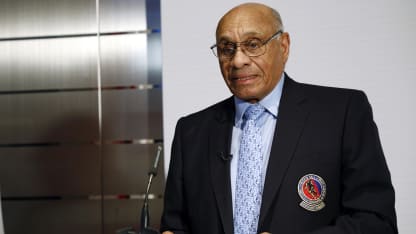"I think the lesson from the film would be to never give up," O'Ree said. "If you feel strongly within your heart, within your mind that you can accomplish a goal, work toward that goal and don't let anybody tell you that you can't attain your goal."
But the film, directed by Laurence Mathieu-Leger, does more than trace O'Ree's path from his boyhood home in Fredericton, New Brunswick, to the Bruins, to his current role as NHL diversity ambassador, to his induction in the Hockey Hall of Fame on Nov. 12, 2018.
It traces O'Ree's roots, revealing that he's the descendant of a slave who escaped a Charleston, South Carolina, plantation and made his way to Canada.
Hot Docs chose to screen "Willie" from among more than 10,000 submissions that it receives yearly. The festival also named "Willie" to its "Hot Docs Special Presentations" program, a designation given to approximately 30 documentaries each year out of nearly 300 in the festival from around the world.
Bryant McBride, the film's producer and former vice president for business development at the NHL, said "Willie" struck a chord with Hot Docs organizers because O'Ree's story delivers a message that transcends sports and explores issues of race.
"It's about opportunity, the right to get and have opportunities and the will to maximize those opportunities," McBride said. "And Willie is the embodiment of that. His journey, what his great-great-grandfather, Paris O'Ree, had to do to obtain his freedom. The sinew that was found in that gentleman got passed directly to Willie. That one event led to Willie changing hundreds of thousands if not millions of lives."
Born in Fredericton on Oct. 15, 1935, the youngest of 13 children, O'Ree grew into a multisport athlete who initially thought that baseball would be his path to the pros.
But when he experienced Jim Crow-era segregation during a tryout in the United States, O'Ree returned to Canada and decided to focus on hockey. Switching sports didn't give O'Ree a reprieve from racial slurs and name-calling.
"Every game I played, there were racial remarks directed toward me: 'You should be back picking cotton. What are you doing in the white man's game?'" O'Ree said in the film.
O'Ree made it to the NHL despite being blinded in his right eye in 1956, a hockey injury he kept secret.
He had a brief NHL career, 45 games over the 1957-58 and 1960-61 seasons, but he enjoyed a lengthy minor league career.
O'Ree was enshrined in the Hall of Fame for his accomplishments off the ice, including his work across North America as the NHL diversity ambassador. In more than two decades, he has helped establish 39 grassroots hockey programs and inspired more than 120,000 boys and girls to play the game.

